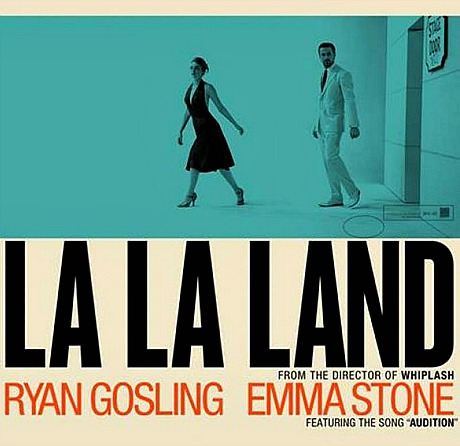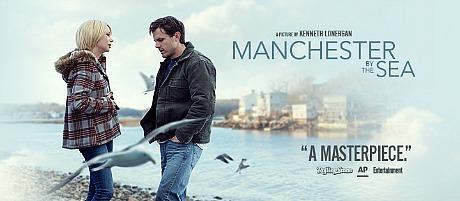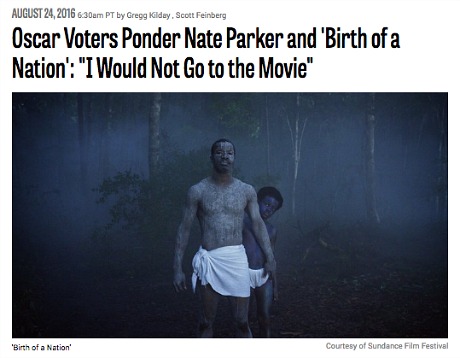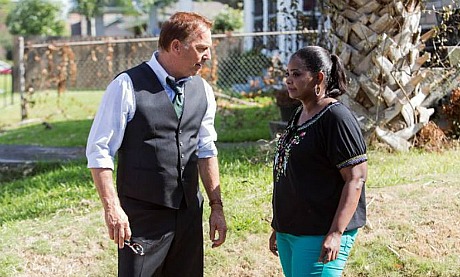I just tried to add Ralph Fiennes‘ performance in A Bigger Splash to my Gold Derby list of Best Supporting Actor preferences. But I couldn’t because the Gold Derby guys don’t have him listed in the option column. Fiennes was glorious in Luca Guadagnino’s film, which I went nuts over last April — a giddy, goading rock ‘n’ roll motormouth. Why didn’t I say something earlier? Because I was behaving like a good little obedient Oscar prognosticator and focusing only on fall releases. No more — consider me woke. Fiennes’ performance is competitive with Lucas Hedges in Manchester By The Sea, Mahershala Ali‘s in Moonlight and Aaron Eckhart in Bleed for This, but the voltage he puts out is, in my opinion, way above the rest. And I was wrong not to beat the drum for him before today. And the Gold Derby guys who haven’t even listed him as an option should be ashamed. Incidentally: I’ve heard that Kevin Costner scores pretty well in Hidden Figures.
A couple of weeks ago I heard about some older Joe Popcorn types at the Hamptons Film Festival who walked out of a La La Land screening. (Huh?) And then a couple of days ago I heard from a casual filmgoer who saw Damien Chazelle‘s film at the Savannah Film Festival, and she too wasn’t all that impressed. (She didn’t care for Ryan Gosling and Emma Stone‘s weak singing voices.) Likewise since Telluride I’ve been hearing about folks who didn’t “like” Manchester By The Sea, mainly because it’s too glum or doesn’t deliver the traditional sunshine-pierces-through-the-clouds moment in the third act.
We’re not talking about moviegoers of extraordinary delicacy or sensitivity here, much less those with any kind of seasoned, sophisticated understanding of cinema language or film history, and there are probably more of them out there than I’d like to admit. Yes, I realize that a Best Picture contender only requires a sizable, passionate cabal to put it over. I’m just saying that there are naysayers out there, and that these rubes are probably still waiting for “the one” (i.e., a Steve Pond term that alludes to a film that will satisfy them completely and then some, that will provide some kind of emotional deliverance that will make their lives seem more whole and meaningful).


Late yesterday Hollywood Reporter award-season pundits Scott Feinberg and Stephen Galloway posted one of their where-are-things-right-now? chit-chat pieces. Like many politically sensitive pulse-takers these guys tend to sand off the edges or otherwise soft-pedal what they’re sensing or hearing so I’ve (a) shortened the piece and (b) boiled the snow out of it.
Point #1: Best Picture winners “tend to reflect the larger zeitgeist,” Feinberg believes. Meaning that if Hillary Clinton wins the election (which of course she will) the Best Picture winner will not be a melancholy masterpiece like Manchester By The Sea (which Feinberg regards as too heart-breaky) but something upbeat, which means Damien Chazelle‘s La La Land, according to this tea-leaf reading, has it in the bag;
Point #2: The Birth of A Nation, already deemed a financial failure, also got the cold shoulder from industry types when it had its first AMPAS screening last weekend. Feinberg-Galloway believe that three alternative racially-themed dramas — Moonlight, Hidden Figures, Loving — will pick up the slack, but the real heavyweight in this realm, I suspect, will be Denzel’s Fences;
Point #3: Ava Duvernay‘s 13th will probably be nominated for a Best Feature Doc Oscar, but will probably be out-pointed by Ezra Edelman‘s O.J.: Made in America.
Point #4: Having seen a portion of Ang Lee‘s Billy Lynn’s Long Halftime Walk, Feinberg says the 120 frames-per-second process in which it was partly shot is “eye-opening…there’s never been anything quite like it,” although it’s “risky” and “whether or not people will like this new look remains to be seen.” Translation: Huzzahs for the audacity but we all know what “remains to be seen” means.

This Hidden Figures trailer is more cerebral and less lighthearted that the one that popped on 8.15, and therefore reflects the product reel that was shown during the Toronto Film Festival on 9.10. Less about chuckles, family and romance and more about science and discrimination and how truly gifted these women were. Wikipedia posted the limited 12.25.16 release weeks ago, but 20th Century Fox is still refusing to officially acknowledge this. The Christmas Day debut will of course allow for awards attention. Who will land the acting noms — Taraji P. Henson or Janelle Monáe, and in what category?
I was surprised to see Martin Scorsese‘s Silence ranked among Kris Tapley‘s top Best Picture spitballs. (Along with Billy Lynn’s Long Halftime Walk, Fences, Florence Foster Jenkins, Hidden Figures, La La Land, Lion, Live By Night, Manchester by the Sea and Moonlight.) Last August I speculated that Silence (which story-wise is no stroll in the park) might get a year-end platform release at best. Yeah, I know — Marty is still cutting it and until he finishes it won’t be dated. This is Scorsese’s pattern. The fate of The Wolf of Wall Street was up in the air until it screened on 11.29 — that’s when it was ready and that’s when it screened.
In the view of Hollywood Reporter columnist Scott Feinberg, the following films are, in this order, apparent frontrunners for a Best Picture Oscar nomination:
1. Damian Chazelle‘s La La Land (HE opinion: Definitely).
2. Denzel Washington‘s Fences (HE opinion: Without a doubt).
3. Theodore Melfi‘s Hidden Figures (HE opinion: What? The trailer clearly indicates this is a lightweight you-go-girl confection).
4. Ang Lee‘s Billy Lynn’s Long Halftime Walk (HE opinion: Probably).
5. Barry Jenkins‘ Moonlight (HE opinion: 50-50 toss-up. Telluride foo-foos have over-praised this intimate, Boyhood-like saga of a black Miami gay guy, which may result in pushback when the schlubby-dubbies catch it).

Barry Jenkins‘ Moonlight, which I saw last night at 8 pm, is a gentle, sensitive saga of a gay Miami black dude named Chiron. The story is told in three chapters over a 16-year period. Three actors portray this extremely guarded and hidden soul — Alex Hibbert as the little-kid version (nicknamed “Little”), Ashton Sanders as the teenage version and Trevante Rhodes as the adult version (called “Black”) in his mid 20s.
Moonlight didn’t destroy me or rock my soul, but I was impressed and moved. I admired it as far as it went. I just had to adjust myself to what it is as opposed to the earth-shaker that some have been describing.

Trevante Rhodes during third-act scene of Barry Jenkins’ Moonlight.
Jenkins (who has worked for years as a senior Telluride Film Festival volunteer) knows what he’s doing, and the subject, for me, is a unique thing. I’ve never seen a “travails of black closeted gay guy” movie before, and this one quietly works on its own terms.
With Birth of a Nation all but out of the race, will Moonlight take its place as the reigning black-experience Best Picture nominee? Or will Denzel Washington‘s Fences be the champ? Or will they both make the cut? Hard to say. I have no dog in this — I’m just watching and wondering. Moonlight is very quiet and specific and soft-spoken, but it never really builds up a head of steam. Which is fine with me. I respected the quiet, deliberate, soft-spoken scheme.
As expected, as you knew it would, Damian Chazelle‘s La La Land has won over Venice Film Festival-attending critics. (Along with certain elites who saw it locally.) The 100% rating on Rotten Tomatoes won’t last. Metacritic is currently dispensing a 91% tally. Lift me up, lay me down, take me there…ooh, aaahh, yeah.
“Not perfect but daring, dazzling, beautiful and distinctive,” enthuses Hollywood Reporter critic Todd McCarthy. “An absolute triumph,” proclaims The PLaylist‘s Jessica Kiang. “A whole-hog recreation of a lavish neo-studio-system musical,” says Variety‘s Owen Gleiberman, “replete with starry nights and street lamps lighting up the innocence of soft-shoe romance, and two people who were meant for each other literally dancing on air.”
Oh, and downplay your 1950s MGM references and think instead of the musicals of Jacques Demy (The Umbrellas of Cherbourg, The Young Girls of Rochefort) as the primary inspiration.
Variety‘s Kris Tapley, who hates the hype and phoniness of Oscar season, has called it “the easiest bet…a GOOD MOVIE [that] seizes your emotions in its final moments and sends you out of the theater on a cloud.”
This morning Hollywood Reporter award-season analyst and handicapper Scott Feinberg finally jumped into the Nate Parker thing (along with THR colleague Gregg Kilday) with an assessment piece that includes four quotes from Academy members about Parker and his situation. Tab Hunter and documentarian Mitchell Block want to cut Parker a break while producer Marcia Nasatir and actress Rutanya Alda (Mommie Dearest) are quite negative about the guy.

The article mostly reiterates a general feeling around town that Parker and his film are fucked as far as Academy or guild member opinions are concerned. I think it’s too late in the cycle to just repeat this by way of quotes. Feinberg should have filed right after the Deadline/Variety stories broke on Friday, 8.12, and certainly in the immediate wake of Variety‘s 8/16 report, filed by Ramin Setoodeh, about the 2012 suicide of Parker and Jean Celestin‘s unnamed victim.
Nasatir: “This is going to set off a thing in this town the likes of which we’ve never seen. I personally find it really hard to separate the man from the film when he wrote, directed and starred in it. Do I want to see a movie from someone who has committed an assault against a woman and who I do not think recognizes his guilt? Right now, based on what I’ve read, I would not go to the movie.”

As I wrote a couple of weeks ago, the title Hidden Figures doesn’t exactly go zing. Brainy mathematicians, Florida sunshine, soul music, Kevin Costner, clever quips, a little romance. Celebrate and salute, but I can see the scheme of this thing from a mile away.
The leads are Taraji P. Henson, Octavia Spencer and Janelle Monáe. I love that House of Cards and Moonlight costar Mahershala Ali is costarring.
Set in the early ’60s and based on a forthcoming non-fiction book by Margot Lee Shetterly, the film recounts the tale of three African-American women — mathematicians Katherine Johnson, Dorothy Vaughan and colleague Mary Jackson — who helped NASA “catch up in the space race.”
I haven’t paid any attention to Theodore Melfi‘s Hidden Figures (Fox 2000, 1.13.17), which has to be one of the most unattractive titles of this or any other year. Right away you’re thinking, “I have a sneaking feeling this movie is going to reveal and celebrate these ‘figures’ but is it okay if they stay hidden? No offense. It’s just that I can see the scheme of this thing from a mile away.”

Kevin Costner, Octavia Spencer in Theodore Melfi’s Hidden Figures.
Set in the early ’60s and based on a forthcoming non-fiction book by Margot Lee Shetterly, the film recounts the tale of three African-American women — mathematicians Katherine Johnson, Dorothy Vaughan and colleague Mary Jackson — who helped NASA “catch up in the space race.” They are played, respectively, by Taraji P. Henson, Octavia Spencer and Janelle Monáe.
Kevin Costner plays the head of NASA who (just guessing here) initially fails to recognize their brilliant calculations but begrudgingly comes to recognize their value to the space program, particularly after they help out big-time with John Glenn’s 1962 orbital flight. Or something like that.
Hidden Figures will be given a limited platform release sometime in December to qualify for awards consideration. This will provide yet another opportunity for guild and Academy members to “get their black on,” as a friend puts it.
I’ve said two or three times that Jack Sholder‘s The Hidden (slithery monster aliens invading and taking over bodies of human hosts) should be remade. It’s too good and too hilarious of a premise to not rework it somehow. It came out nearly 35 years ago, which means that most Millennials and Zoomers have barely heard of it, much less seen.
On 3.5.18, or roughly three and a half years ago, I suggested that one way to remake The Hidden would be to blend it with This Gun For Hire. Use an early ’40s milieu and shoot it in black and white within a 1.37:1 aspect ratio, but with slimey, squishy monsters living inside the traitors.
I haven’t thought through the particulars, but the basic character would still be the half-psychopathic, half-sympathetic hit man Raven (Alan Ladd‘s role), and he’s been hired to rub someone out. But once he gets wind of a certain cabal of alien-controlled governmental figures his arc changes…he’s still a shady loner but in a pivotal position, and non-alienized cops begin to consider the possibility that he’s not the malevolent figure they had him pegged as.
Plus I love the concept of black-and-white CG monsters. To me that’s ice cream, cake and syrup. There were two or three monster-glimpse moments in The Lighthouse (King Triton, mermaid, demonic seagull) that really turned me on, and the idea of a ’40s monster noir in 1.37 feels delicious. I realize that 98% of the audience regards black-and-white CG as a fringe appetite at best. I still love it. This Gun For Hire With Monsters could be made for a price.


 Really Nice Ride
Really Nice RideTo my great surprise and delight, Christy Hall‘s Daddio, which I was remiss in not seeing during last year’s Telluride...
More » Live-Blogging “Bad Boys: Ride or Die”
Live-Blogging “Bad Boys: Ride or Die”7:45 pm: Okay, the initial light-hearted section (repartee, wedding, hospital, afterlife Joey Pants, healthy diet) was enjoyable, but Jesus, when...
More » One of the Better Apes Franchise Flicks
One of the Better Apes Franchise FlicksIt took me a full month to see Wes Ball and Josh Friedman‘s Kingdom of the Planet of the Apes...
More »

 If I Was Costner, I’d Probably Throw In The Towel
If I Was Costner, I’d Probably Throw In The TowelUnless Part Two of Kevin Costner‘s Horizon (Warner Bros., 8.16) somehow improves upon the sluggish initial installment and delivers something...
More » Delicious, Demonic Otto Gross
Delicious, Demonic Otto GrossFor me, A Dangerous Method (2011) is David Cronenberg‘s tastiest and wickedest film — intense, sexually upfront and occasionally arousing...
More » Queer for “Virginia Wolff” Color Snaps
Queer for “Virginia Wolff” Color SnapsPosted on 11.27.23: “One thing that’s always bothered me about Virginia Wolff is that George and Martha’s young guests —...
More »


